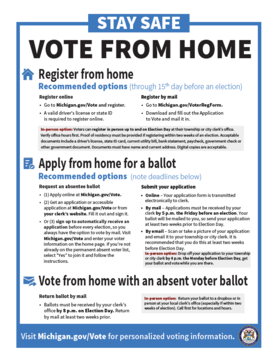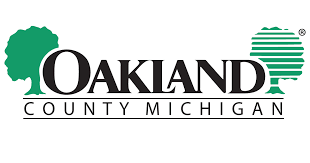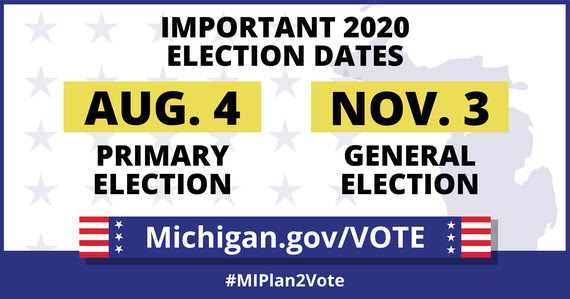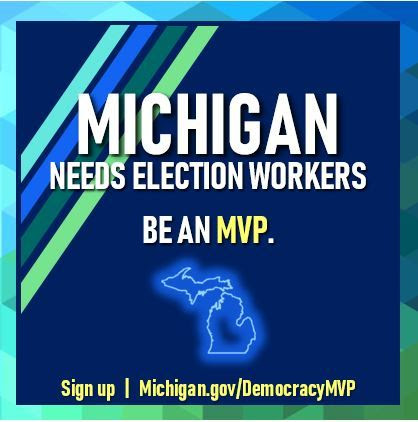
by Becky Andrus | Jul 30, 2020 | Uncategorized

Governor Whitmer Amends MI Safe Start Order to Limit Indoor Gatherings, Save Lives
Statewide, bars are closed for indoor service and indoor gatherings are restricted to no more than 10 people
LANSING, Mich. – Today, Governor Gretchen Whitmer signed Executive Order 2020-160 and Executive Order 2020-161, amending Michigan’s Safe Start Order and issuing revised workplace safeguards. Under the Safe Start Order, starting July 31, 2020, statewide indoor gatherings will be limited to 10 people and bars will be closed for indoor service across the state, including in Regions 6 and 8.
“As we see COVID-19 cases continue to rise, Michiganders cannot afford to drop our guard. We must take every step possible to saave lives, protect the brave men and women on the front lines, and avoid overwhelming our healthcare system while we continue to combat COVID-19,” said Governor Whitmer. “After seeing a resurgence in cases connected to social gatherings across the state, we must further limit gatherings for the health of our community and economy. By taking these strong actions, we will be better positioned to get our children back into classrooms and avoid a potentially devastating second wave.”
COVID-19’s resurgence is closely associated with super-spreading events at large social gatherings, often attended by young people. An outbreak at a Lansing bar has resulted in 187 infections; more than 50 cases have been linked to a single house party in Saline; and a sandbar party at Torch Lake over the July 4 weekend led to at least 43 confirmed cases. Therefore, Executive Order 2020-160 limits statewide indoor gatherings to 10 people or less and, across most of the state, limits outdoor gatherings to 100. (The outdoor gathering limits will remain at 250 in Regions 6 and 8.)
Executive Order 2020-160 also orders that bars in every region, including those in regions 6 and 8, must close for indoor service if they earn more than 70% of their gross receipts from sales of alcoholic beverages.
Under the governor’s orders, Detroit casinos will also be allowed to open on August 5, but their occupancy will be limited to 15% capacity. Casinos must also, among other things, conduct a daily entry screening protocol for customers and employees, temperature screening. Casinos must require patrons to wear a face covering, except while eating or drinking or for identification purposes.
Executive Order 2020-160 will rescind Executive Orders 2020-110, 2020-115, 2020-120, 2020-133, and 2020-143.
To view Executive Order 2020-160 and Executive Order 2020-161, click the links below:
|

by Becky Andrus | Jul 29, 2020 | Uncategorized
|
Press Release
FOR IMMEDIATE RELEASE: July 29, 2020
CONTACT: Lynn Sutfin, 517-241-2112, SutfinL1@michigan.gov
Opioid overdoses surge during COVID-19 pandemic;
MDHHS promotes treatment and resources
LANSING, Mich. – Emergency Medical Services (EMS) and emergency departments (EDs) in Michigan have both seen substantial increases in opioid overdoses since the beginning of the COVID-19 epidemic. These increases are a tragic reminder of the continued toll of the opioid epidemic, and the Michigan Department of Health and Human Services (MDHHS) urges anyone with opioid use disorder to carry naloxone and practice other safety measures to prevent overdose deaths.
According to statistics gathered by MDHHS, EMS responses for opioid overdose increased by 33 percent from April to May of this year. Additionally, EMS responses for opioid overdoses from April through June 2020 were 26 percent higher than the same period in 2019. EMS responses for opioid overdoses increased for all regions and nearly all demographic groups, with the exception of residents aged 65 years and older.
“Opioid overdoses kill far too many Michiganders, and it’s a double tragedy that the pandemic has exacerbated this crisis,” said Dr. Joneigh S. Khaldun, chief deputy for health and chief medical executive. “If you or someone you love has an opioid use disorder, please take steps to prevent overdose deaths – like carrying naloxone and never using alone.”
The data provides other insights on how the pandemic has impacted the opioid crisis. Patients were more likely to refuse transport to EDs in April to June compared to the same period in 2019. The percentage of opioid overdose EMS responses that resulted in the patient declining transport to EDs nearly doubled from 7.7 percent April to June 2019 to 14.3 percent April to June 2020.
While all racial groups demonstrated increases in opioid overdoses and transport refusals during the pandemic, preliminary data suggests white residents experienced the greatest increases during this period. Despite this finding, longstanding racial disparities continue to impact how black residents experience opioid overdoses, resulting in a far higher opioid overdose rate. The average monthly rate of EMS responses for opioid overdoses among black residents was 219.8 per 100,000 residents, as compared to 123.4 among white residents between April and June.
After an initial drop in April, ED visits for opioid overdoses increased in May and June to pre-pandemic levels despite EDs seeing fewer visits overall in Michigan during the pandemic. The total number of ED visits April to June 2020 declined 38 percent compared with April to June 2019, while the number of opioid overdose ED visits increased by 2 percent. It is too early to determine if opioid overdose deaths have increased following the onset of the pandemic due to the length of time required to finalize death certificates.
MDHHS continues to use every available tool to combat the opioid epidemic during this challenging time, including ensuring continued access to Syringe Service Programs (SSPs) and increasing access to naloxone, the medication used to treat overdoses, for individuals and organizations. Treatment for opioid use disorder, which may include medications used to combat the effect of opioids on a person’s brain, remains available. For individuals who are not ready to access treatment, MDHHS also recommends safer drug use to prevent further injury and death due to overdose during this time. MDHHS urges Michiganders to use the following treatment and safer drug use resources:
If you or someone you know has an opioid use disorder:
- Access resources to support the mental and physical health of those with substance use disorder during the COVID-19 pandemic.
- Contact your primary care provider before you run low on necessary medications.
- Ensure naloxone is readily available. Naloxone for All and NEXT Distro will mail naloxone at no cost to anyone in Michigan. Individuals can request naloxone online. MDHHS has also created an online naloxone portal where community organizations can request free naloxone.
- Practice safer drug use (safety practices that prevent overdose deaths) and encourage others to do the same. More information is available in Safer Drug Use during the COVID-19 Outbreak.
- Never Use Alone is a service anyone can call while using drugs. The caller will be connected to a person who will seek emergency services for them if they drop off the line or don’t respond to a return call. Call 800-484-3731 or visit NeverUseAlone.com to learn more.
- Find an SSP near you that can provide sterile needles, naloxone and other life-saving resources.
If you or someone you know would like to seek treatment for opioid use disorder:
If you or someone you know is in recovery:
- Reach out with a phone call, text or email to let him or her know you are there. Model good coping behaviors yourself.
- Share the COVID-19 hotline number (888-535-6136) and tell them to press “8” for free emotional support counseling.
- Direct them to Michigan.gov/StayWell for a list of other help lines, including a peer “warm line” for individuals in distress who want to talk to someone who understands substance use disorders, the National Disaster Distress Helpline at 800-985-5990 and the National Suicide Prevention Lifeline at 800-273-8255.
- Call 211. Anyone struggling or seeking resources for substance use treatment services can call this free service that connects Michigan residents with health resources in their communities.
For more information about overdoses and resources for prevention and treatment, visit Michigan.gov/Opioids. |

by Becky Andrus | Jul 29, 2020 | Uncategorized
Aug. 4 statewide primary election:
Voters can vote safely from home or in person
Voters can safely cast their ballots in Michigan’s statewide primary election on Aug. 4 to determine candidates at the local, state and federal levels for the general election on Nov. 3.
The Aug. 4 primary election has a partisan section and voters should only vote in one party section. Voters must choose whether to vote for candidates in either the Democratic Primary or Republican Primary (or neither). If a voter crosses over and votes for candidates in both primary sections, none of those votes will count. Every voter can vote in the nonpartisan and proposal section of the primary ballot.
The Secretary of State encourages voters who already have a ballot at home to fill it out and sign the back of the envelope. Then, with the election a week away, voters should put it in the mail immediately or, to avoid possible U.S. Postal Service delays, deliver it to their local clerk’s secure ballot drop box if they have one, or to the clerk’s office if possible.
In-person voting will be available in every jurisdiction for voters who choose to do so and will be provided in accordance with social distancing and safety protocols to ensure the safety of voters and election workers. Wearing a mask is strongly encouraged.
Download the Stay Safe voting guide and Safe Voting fact sheet for more details.
 Applying for an absent voter ballot Applying for an absent voter ballot
Voting from home is a right all Michigan voters have and is a safe way to vote and protect your health, and the process is secure.
To obtain an absent voter ballot, voters must submit a request to their local clerk in one of the following ways:
- Voters with a Michigan driver’s license or ID may apply online for an absent voter ballot at Michigan.gov/Vote.
- Voters may download and complete an absent voter ballot application at Michigan.gov/Vote, print it and sign it, OR write out a request for an absent voter ballot and sign it.
- Signed applications/requests may be mailed to the clerk OR scanned or photographed and emailed to your clerk. Make sure the entire application, including your signature, is readable in the picture.
- You can find your clerk’s contact information at Michigan.gov/Vote or by calling your city or township office.
- Accessible absent voter ballot applications are available at Michigan.gov/Vote. Voters with qualifying disabilities may apply for an accessible electronic ballot that can be marked remotely, printed and returned to the clerk.
- Requests to have an absent voter ballot mailed to you must be received by your clerk no later than 5 p.m. the Friday before the election (July 31). However, to avoid possible U.S. Postal Service delays as Election Day nears, voters are encouraged to request their absent voter ballot in person at their clerk’s office.
Voting and returning an absent voter ballot
Once your request is received by the local clerk, your signature on the request will be checked against your voter registration record before a ballot is issued. After receiving your absent voter ballot, you have until 8 p.m. on Election Day to complete the ballot and return it to the clerk’s office. Your ballot will not be counted unless your signature is on the outside of the return envelope and matches your signature on file.
If you’re already registered at your current address, you can request an absent voter ballot in person at your clerk’s office anytime up to 4 p.m. on the day prior to the election.
In-person voting available
Beginning 40 days prior to Election Day, voters have the option of voting early in their clerk’s office until 4 p.m. on the day before the election.
Polling places will be open in every jurisdiction on Election Day for voters who want to vote in person and will follow distancing, hygiene and safety protocols. Voters are encouraged to wear masks and maintain social distance while at the polls.
Each polling location will have at least one voting station adapted to allow a person to vote while seated. In addition, all voters, including voters with disabilities, have access to a Voter Assist Terminal in all polling places. The Voter Assist Terminal helps the voter mark a ballot. It will mark the ballot with the voter’s choices but does not tally the votes. Once the ballot is marked, it is counted in exactly the same fashion as all other ballots. |
You can register to vote through Election Day
Citizens who are not yet registered to vote but who wish to do so in the Aug. 4 election may do so at the office of their local clerk up until 8 p.m. on Election Day. You can find your clerk’s information at Michigan.gov/Vote.
Proof of residency must be provided if registering within two weeks of an election. Acceptable documents include a driver’s license, state ID card, current utility bill, bank statement, paycheck, government check or other government document. Documents must have name and current address. Digital copies are acceptable.
Be democracy’s MVP:
Sign up to be an election worker today!
Election workers are the Most Valuable Players of our democracy, ensuring free and fair elections for all. And our democracy needs election workers more than ever for the upcoming elections in August and November. Serving as an election worker is a paid position, and all election workers are trained on proper protocols.
During the coronavirus crisis, election workers are needed to assist clerks and count ballots. They will adhere to strict public health guidelines, including exercising social distancing, using sanitary equipment, and maintaining strong hygiene to protect themselves and others from coronavirus transmission.
Interested voters can sign up at Michigan.gov/DemocracyMVP.
Elections are the foundation of our democracy, and the way that all Michiganders can hold their leaders accountable in times of uncertainty.
|
|

by Becky Andrus | Jul 29, 2020 | Uncategorized

Press Release
FOR IMMEDIATE RELEASE: July 29, 2020
CONTACT: Bob Wheaton, 517-241-2112, wheatonb@michigan.gov
MDHHS begins partnership with Dave Thomas Foundation to find forever homes for children in foster care more quickly
LANSING, Mich. – The Michigan Department of Health and Human Services (MDHHS) is getting a boost to its efforts to find loving adoptive homes for children more quickly from the Dave Thomas Foundation for Adoption.
MDHHS and the foundation, a national nonprofit started by the fast food chain founder, are announcing Michigan’s participation in the Foundation’s signature program, Wendy’s Wonderful Kids®, which will on finding adoptive homes for children who have been in foster care the longest and cannot safely return to their families. The partnership funds 37 adoption professionals to serve youth at highest risk of aging out of foster care, including teenagers, children with special needs and siblings.
“Each day a child spends in foster care waiting for a permanent family is too long,” said JooYeun Chang, executive director of the Children’s Services Agency within MDHHS. “Wendy’s Wonderful Kids has demonstrated success at finding families for children who have waited in foster care the longest, and we are thankful for the opportunity to expand this program in Michigan.”
Also participating in the project are two existing MDHHS child welfare partners – Orchards Children’s Services and Judson Center Child & Family Services. Those two partners will employ adoption resource consultants who are being trained to implement the Dave Thomas Foundation’s evidence-based, child-focused recruitment model. The model focuses on finding an adoptive family from the child’s known network. Prior to the expansion of the program in Michigan, there were three positions already in place at Spaulding for Children and St. Vincent Catholic Charities.
“We look forward to working with the State of Michigan as well as Orchards and the Judson Center to serve more children in foster care who are often overlooked and need our help more than ever,” said Rita Soronen, president and CEO of the Dave Thomas Foundation for Adoption. “No child should face the COVID-19 crisis, or any other, without the stability and support of a permanent, loving home.”
A rigorous, five-year national evaluation found that a child referred to the Wendy’s Wonderful Kids program is up to three times more likely to be adopted. Based on this evaluation and a successful pilot of the program, Ohio became the first state to expand Wendy’s Wonderful Kids statewide in 2012. In 2017, the Foundation launched a 12-year business plan to fully scale the program across all 50 states and Washington, D.C. Nearing the end of phase one of the plan, statewide expansion is underway in Colorado, Kentucky, Louisiana, Nevada, New York, North Carolina, Ohio, Oklahoma, Utah, Washington and now, Michigan.
To date, Wendy’s Wonderful Kids has helped to find adoptive homes for more than 9,500 children across North America, including 195 youth in Michigan.
“We are dedicated to finding forever families for children in foster care,” said Rhonda Parker, director of development for Orchards Children’s Services. “Partnering with the Michigan Department of Health and Human Services and the Dave Thomas Foundation for Adoption in these challenging times will allow us to help even more children and adoptive families.”
Khadija Walker-Fobbs, chief strategy officer of the Judson Center added, “Judson Center is elated to be able to expand the crucial work of Wendy’s Wonderful Kids. Any time we can deepen supports for children in Michigan through partnerships, it is cause for celebration.”

by Becky Andrus | Jul 29, 2020 | Uncategorized
Coronavirus-Focused Virtual Business Workshops Among Several Offered in August by County’s Small Business Team
Pontiac, Michigan – Business owners and entrepreneurs who may have had their operations or aspirations interrupted by the coronavirus pandemic have a chance to get back on track with the help of expert business counselors from Oakland County’s small business team.
The center is offering a series of workshops as part of its August schedule that focus on business strategies for responding to the pandemic, including:
- Starting a Business
- Pivoting Your Business to Thrive in a New Environment
- Market Research Basics During the Coronavirus Crisis – Consumers Have Changed, Will You?
- How to Write a Business Plan in the New Economy
“Our economic development small business team is ready to help you and your business through the pandemic or help you formalize your entrepreneurial vision,” Oakland County Executive David Coulter said. “These workshops give useful direction and strategies to help business owners chart a course for success. I encourage business owners and entrepreneurs to take advantage of these classes.”
All workshops are free unless otherwise noted and require pre-registration. The August workshop schedule is:
A 360° Perspective on Your Business
August 4 | 11 a.m. – noon | Register Here Cost: Free
Sometimes taking a step back is more important than taking a step forward. This virtual workshop will help you prioritize business activities when everything seems like an emergency. Get introduced to a suite of visual tools (course materials) to quickly evaluate your business and how to grow your business. This workshop is for existing businesses.
Starting a Business
August 5 | 9 – 11 a.m. | Register Here Cost: Free
Thinking about starting a business during the era of COVID-19? We can help. This virtual workshop is designed for individuals who are at the beginning stages of starting a business. Topics like startup costs, financing options and business planning are introduced along with the steps to get started. If you are ready to start your business, we are ready to help. This workshop is for startup businesses.
Startup Cash Flow Analysis – Don’t Get in Over Your Head
August 11 | 11 a.m. – Noon | Register Here Cost: Free
Get ahead of the curve, prepare for the next steps and don’t get in over your head. This virtual workshop helps new entrepreneurs gain a better understanding of the cash demands required to successfully start a business. With 50 percent of small businesses failing within the first five years, proper startup cash flow analysis is paramount to a successful launch. Concepts found in the Startup Cash Analysis Workbook (course materials) and estimating cash needs will be covered. Don’t be astatistic. Register today. This workshop is for pre-start businesses.
The Five Steps to Networking Mastery 2020
August 11 | 9 – 11:30 a.m. | Register Here Cost: $40
We have all heard that it is not what you know but whom you know. BARNACLES! It’s all about how you are known. This brief, impactful training will teach you how to become an individual to whom people want to refer more business. Consider attending if you are frustrated with your current networking; uncomfortable networking but need to do it more; or have a new position and want to increase your pipeline. The better we get at networking, the better our network. Presented by Terry Bean, founder of Networked Inc. and Motor City Connect.
CEED Lending Small Business Loan Orientation
August 12 | 9 – 11 a.m. | Register Here Cost: Free
If your business is in Oakland County and you need alternative financing, consider a CEED Lending Small Business Loan. The workshop introduces you to the requirements and process necessary to qualify for a CEED loan. CEED Lending is an initiative of Great Lakes Women’s Business Council.
Pivoting Your Business to Thrive in a New Environment
August 13 | 1 – 2 p.m. | Register Here Cost: Free
Successful businesses pivot to adjust to changing times. New business realities due to COVID-19 require that many new and well-established businesses re-evaluate their business models. This virtual workshop covers three areas of your business that hold clues on how to successfully pivot your business and stay alive. The difference between success and failure may lie in the approach itself. This
workshop is for existing and startup businesses.
Market Research Basics During the Coronavirus Crisis:
Consumers have Changed, Will You?
August 18 | 1 – 2 p.m. | Register Here Cost: Free
New customer expectations necessitate changes in business practices. This virtual workshop is not designed to predict the “new normal” but to help you understand customer expectations, incomes and spending habits during the era of COVID-19. Learn more about changes in consumer behavior for business-to-customer (B2C) businesses, identify consumer behaviors that are likely to stick long term and market resources to help reach and retain customers. This workshop is for existing businesses.
From Good Idea to Great Concept
August 19 | 9 – 11 a.m. | Register Here Cost: Free
A great idea is just the first step along an entrepreneurial journey. Learn how to take your idea and build a great business concept that you can implement. Hear how to move from idea to concept and how successful entrepreneurs adjust their concept to give themselves the best chance at creating a successful business. This workshop is for startup businesses.
Projecting Cash Flow – Overcoming Business Interruptions and Beyond
August 25 | 1 – 2 p.m. | Register Here Cost: Free
This may be the most important class a small business owner will ever take. This virtual workshop helps you gain a greater understanding of the cash demands required to successfully manage a business. Cash flow for normal, emergency and recovery scenarios are covered, including use and concepts of the Cash Flow Projection Workbook (course materials). A good cash flow management
system is paramount to the success of your business. This workshop is for new and existing businesses.
How to Write A Business Plan in The New Economy
August 26 | 11 a.m. – Noon | Register Here Cost: Free
Doing business in the era of COVID-19 might require changes in your business plan, the way you market your business and the way employees interact with customers. This virtual class i for those who need to re-invent their businesses, require a new business plan during the
COVID-19 pandemic and beyond. If COVID-19 has turned your business model topsy-turvy, this information is for you. This workshop is for existing and startup businesses.








 Applying for an absent voter ballot
Applying for an absent voter ballot


